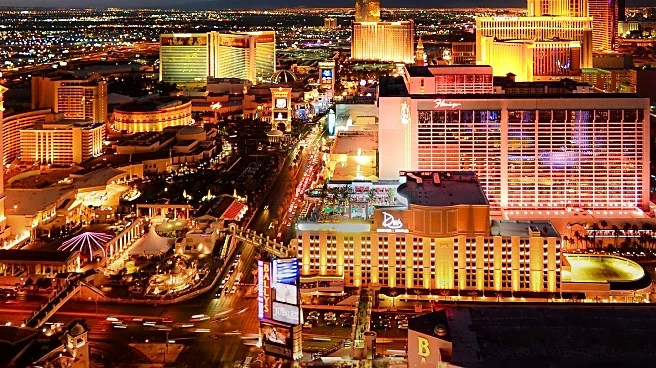What's Happening?
The Housekeeping Olympics, an annual event held in Las Vegas, Nevada, has recently gained significant attention on social media. Organized by the Indoor Environmental Healthcare and Hospitality Association,
the competition features teams from major Las Vegas hotels competing in various housekeeping tasks such as bed making, mopping relays, and vacuuming challenges. The event, held at Michelob Arena, has been running for 35 years and aims to celebrate the dedication of hospitality workers. However, the event has sparked mixed reactions online, with some viewers expressing discomfort and labeling it as 'dystopian' or a 'humiliation ritual.' Critics argue that the competition turns low-wage jobs into a spectacle, potentially reinforcing the narrative that faster work is better without increasing pay. Despite the controversy, the event continues to be a platform for recognizing the skills and efforts of housekeeping staff.
Why It's Important?
The Housekeeping Olympics highlights broader societal issues related to labor and recognition in the hospitality industry. The event underscores the ongoing debate about the value and perception of low-wage jobs, particularly those predominantly occupied by women. The competition's format, which emphasizes speed and efficiency, raises questions about labor practices and the pressure on workers to perform under competitive conditions without additional financial incentives. The social media backlash reflects a growing awareness and critique of how labor is commodified and celebrated, potentially influencing public discourse on workers' rights and industry standards. The event also serves as a reminder of the gender disparities in domestic work, as statistics show women disproportionately engage in housework compared to men.
What's Next?
The controversy surrounding the Housekeeping Olympics may prompt organizers to reconsider the event's format and objectives. Stakeholders in the hospitality industry might face increased scrutiny regarding labor practices and employee compensation. The social media reaction could lead to discussions about how to better honor and compensate housekeeping staff, potentially influencing policy changes or industry standards. As public awareness grows, there may be calls for more equitable recognition and rewards for hospitality workers, aligning with broader movements advocating for fair labor practices and gender equality in the workplace.
Beyond the Headlines
The Housekeeping Olympics raises ethical questions about the commodification of labor and the societal value placed on certain types of work. The event's portrayal as a competition may inadvertently reinforce stereotypes about low-wage jobs and the individuals who perform them. Additionally, the lack of prize money highlights the ongoing issue of inadequate compensation for essential workers, sparking discussions about the need for systemic change in how labor is valued and rewarded. The event also touches on cultural dimensions, as it reflects societal attitudes towards domestic work and the gender roles associated with it.









